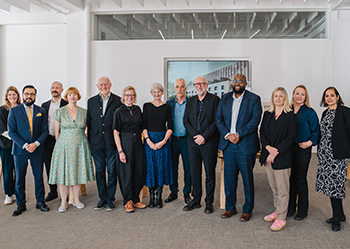University News Last updated 24 October 2024

A “unified global goal for land use” can help reverse the devastating impacts of climate change – as long as agreement is found quickly, according to landscape experts attending a recent conference hosted by Birmingham City University (BCU).
Event organiser Kathryn Moore, Professor of Landscape Architecture at BCU, told delegates at the Urban Thinkers Campus event at the start of October that “the planet is facing an environmental crisis” that needs addressing rapidly.
“The landscape is under intense pressure,” said Professor Moore. “There is a common concern about land degradation and a shared commitment to rethink how we use our finite resources.”
The conference brought together experts from around the world to discuss how the challenges facing the planet could be addressed by rethinking land use and land use policy.
On day one, representatives from the United Nations Environment Programme, CPRE The Countryside Charity, SLA design studio, WWF Cities, Maulana Azad National Institute of Technology, Circular Cities Network, and Town and Country planning Association shared research insights and real-world impacts.
They also explored revolutionary ideas for land use and the policy drivers developed by the West Midlands National Park Lab – an international think-tank for integrated landscape-led visioning and development that’s based at BCU.
On day two, landscape experts converged to rethink land use in the context of a proposal for an international landscape convention to guide future policy and practice.
Glen Howells, founder of Howells architecture firm in Birmingham, set the tone for the event when he compared the significance of the gathering to the 1988 Highbury initiative – an effort to address urban planning issues and reliance on cars in the city.
“Landscape is perhaps the most cohesive lens through which we can address today’s planetary crises – ecological collapse, climate change, and pollution,” said Andrew Rudd, Urban Environment Officer at UN Habitat and Urban Thinkers Campus speaker and panellist.
“As urban populations grow, especially in the developing world, the quality of development will be critical. Will it be compact and integrated or sprawling and fragmented?
“We need to create a unified vision for urban landscapes and engage with decision-makers and the private sector to drive this transformation. Now is the time for bold action.”
Joanna Averley, Chief Planner for the Ministry of Housing, Communities, and Local Government, reflected in her talk that “engaging with global landscape experts has reinforced the need to deliver multiple outcomes as we shape our natural and built environments”.
She added: “The UK government has made strong commitments to ecological restoration, achieving net zero, and supporting communities through housing and infrastructure.
“Our recent focus on local nature recovery and strategic planning provides an opportunity to step back and ensure we’re getting it right, both in national policy and local delivery.”
Taps Mtemachani, Director of Transformation and Partnership for the NHS Black Country ICB, informed delegates that “landscape holds the key to keeping people well”.
He added: “Looking after our landscape is a critical building block for resilient and healthier communities.
“It’s essential that people are empowered to take ownership of their communities. Only then will they value where they live, be proud of their space, and work together to look after it.”
Rachel Fisher, Deputy Director for Land Use Policy at DEFRA, added that “it’s vital to make the often invisible but important environmental benefits more tangible in people's daily lives.”
She added: “We’re integrating environmental priorities with urban development through local nature recovery strategies and biodiversity net gain, promoting multi-functional land use that benefits people and reconnects communities to the landscape they live in.
“The West Midlands National Park is a great example of doing this in a human-centred way.”
Francesco Bandarin, former Assistant Director-General of UNESCO for Culture, brought the conference to a close by reinforcing the need for an overarching global agenda for land use.
“It’s striking that the different contributions shared by our experts have all had one thing in common – a concern for what’s happening to our land and what we can do about it,” he said.
“There’s a real desire to understand and utilise the relationship between people, land use, and nature.
“Now we must clarify our vision and map how we get there with the resources and data we have. It’s about transformation. We’re on the cusp of turning this vision into our reality.”
Professor Moore affirmed that “there’s a collective determination to turn these conversations into meaningful, sustainable action for the future of our landscape”.
In other words, she said, “watch this space”.